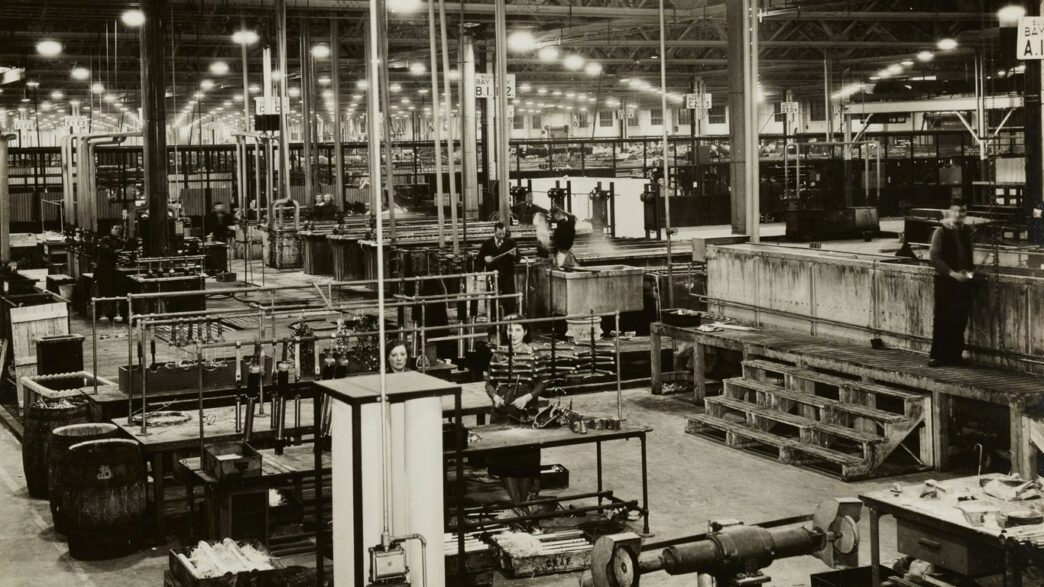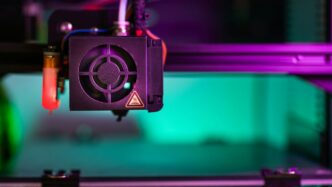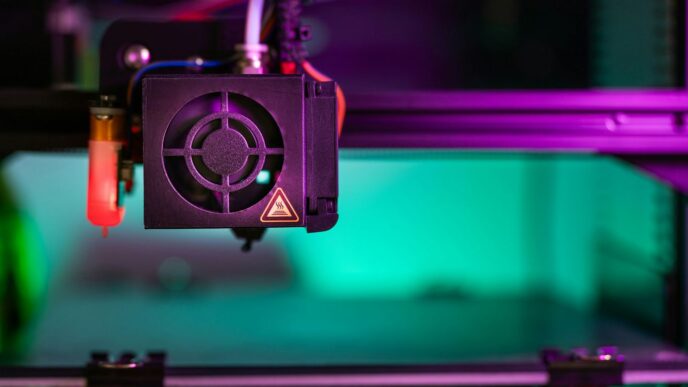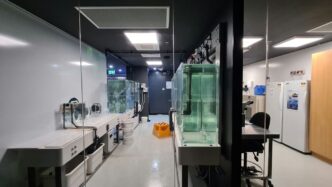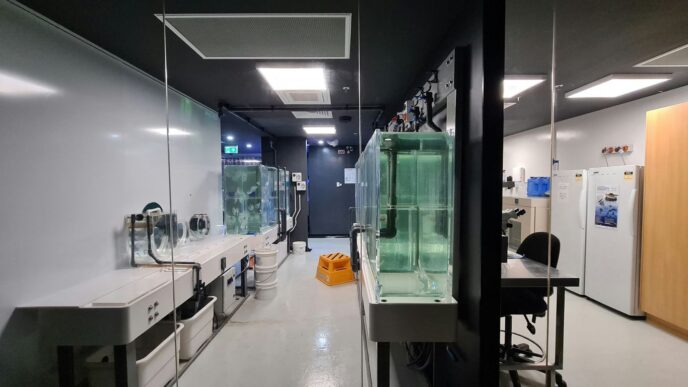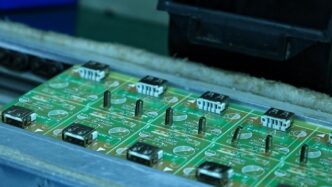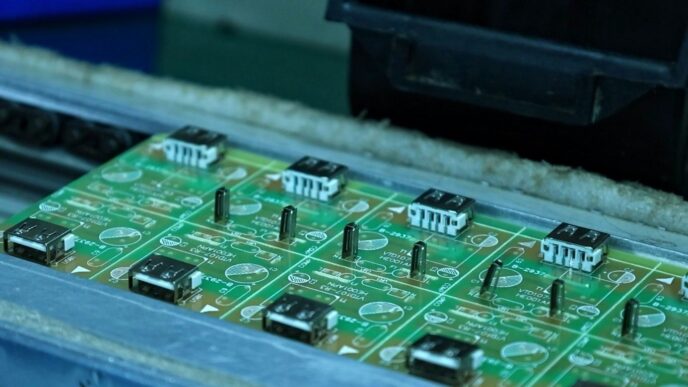It’s pretty amazing when you think about it, but the tiny chips inside our gadgets often have roots right here in the Netherlands. This country has become a major player in making the equipment that designs and builds most of the world’s microchips. It’s not just one or two big companies, either. There’s a whole network of people and businesses working together, from universities to equipment makers. This whole setup means the Netherlands is a pretty big deal globally for anything related to semiconductors.
Key Takeaways
- The Netherlands is a global leader in semiconductor manufacturing, with a strong history of innovation and a complete value chain.
- Major Dutch companies like ASML, NXP, and Besi are key players in the global semiconductor market, especially in areas like lithography and automotive chips.
- A collaborative approach involving government, industry, and academia, particularly in hubs like Brainport Eindhoven, drives the Dutch semiconductor ecosystem.
- The country benefits from a strong pipeline of technical talent and a supportive educational system for the semiconductor sector.
- Government support, strategic location, and a growing venture capital scene further boost the Netherlands’ position in the global semiconductors market.
Netherlands: A Global Leader in Semiconductor Manufacturing
It’s pretty wild when you think about it, but a lot of the tiny computer chips that power our world actually have roots right here in the Netherlands. Seriously, like 85% of all chips made globally use equipment that comes from Dutch companies. That’s a huge chunk! This country has really built up a reputation for being a major player in making these essential components. It’s not just about one or two big companies, either; it’s a whole system that works together.
Exponential Growth Fueled by Innovation
The semiconductor industry here has seen some serious growth, and it’s all thanks to a constant push for new ideas and better ways of doing things. Decades of work have gone into building this industry, and it’s paid off. The Netherlands has become known for leading the charge in industrializing chip production. When the big companies started setting up shop, a whole network of suppliers and experts followed, bringing even more high-tech know-how. Plus, with so many skilled people within easy reach and great digital connections, getting things done and coming up with new ideas happens much faster.
A Complete Semiconductor Value Chain
What’s really special is that the Netherlands is one of only three countries in the world that has all the pieces needed for the entire semiconductor process. Think about it: from the initial design and testing all the way through to manufacturing, assembly, and the final packaging of the chips. You can find all the necessary partners and services within a relatively small area, usually within about 220 kilometers. This makes it way simpler for companies to focus on growing their business instead of chasing down different suppliers.
Driving Global Ambitions
Having a strong base here really helps companies achieve their goals on a worldwide scale. The Netherlands offers a solid foundation with its advanced technology, skilled people, and a business environment that’s set up for success. For anyone in the semiconductor business looking to expand, this country is a smart choice. It’s not just about doing business; it’s about making your global plans a reality. The country’s strategic location also plays a big part in making sure products can get where they need to go efficiently, connecting the Netherlands to global markets.
Pioneering Dutch Semiconductor Companies
The Netherlands isn’t just a player in the semiconductor world; it’s a powerhouse. Several Dutch companies are not only well-known but are actually setting the pace for the entire global industry. It’s pretty amazing when you think about it, how many of the chips powering our daily lives have some connection back to this small country.
ASML: The Lithography Powerhouse
When you talk about cutting-edge chip manufacturing, ASML is the name that comes up. They are the only company on the planet that can make the super-advanced EUV (Extreme Ultraviolet) lithography machines. These machines are absolutely critical for producing the most complex chips out there. ASML has a massive market share, something like 90%, in this specialized area. It’s a huge deal. They employ tens of thousands of people worldwide and are a major reason why the Netherlands is so important in this field. Their technology is what allows for smaller, faster, and more efficient computer chips.
NXP Semiconductors: Automotive and IoT Innovation
NXP Semiconductors is another big name with Dutch roots. They’re really strong in chips for cars and for the Internet of Things (IoT) devices that are becoming so common. Think about all the sensors and smart features in modern vehicles – NXP is a big part of that. They hold a significant chunk of the global market for automotive semiconductors. Their Eindhoven campus is a major center for research and development, showing how important the Netherlands is for this kind of tech. It’s not just about phones and computers; NXP is making sure our cars and homes get smarter too.
Besi and ASM International: Equipment Specialists
Then you have companies like Besi and ASM International. Besi focuses on the assembly and packaging of semiconductors, which is a really important step in making chips. They’re a leader in die bonder equipment, used to attach the actual chip to its packaging. ASM International, on the other hand, is known for its equipment used in processing wafers, the thin slices of silicon where chips are made. They’re particularly strong in atomic layer deposition (ALD), a technique for adding super-thin layers of material. These companies might not be as famous as ASML, but their equipment is just as vital for chip production. Without them, the whole process wouldn’t work. It’s this combination of different specialized companies that makes the Dutch semiconductor ecosystem so strong. You can find a lot of this innovation happening within a short distance of each other.
The Robust Dutch Semiconductor Ecosystem
It’s pretty amazing how the Netherlands has built such a strong setup for semiconductor companies. It’s not just one or two big names; it’s a whole network of businesses, researchers, and government folks working together. This collaborative spirit is a big reason why things move so fast here.
Brainport Eindhoven: A High-Tech Hub
When you talk about Dutch tech, Eindhoven often comes up first. It’s like the heart of it all, especially for semiconductors. This area, known as Brainport Eindhoven, is packed with companies, research places, and skilled people. They’re doing everything from designing chips to building the machines that make them. It’s a place where new ideas seem to pop up everywhere, and companies like NXP Semiconductors have a major presence here, making it a key spot for automotive and IoT chip development.
Collaborative Quadruple Helix Approach
What’s really interesting is how they involve everyone in the process. It’s called the ‘quadruple helix’ approach. Basically, it means bringing together universities, businesses, the government, and even the general public. This way, everyone has a say, and projects get support from all sides. It helps make sure that what’s being developed actually meets real-world needs and that there’s a good plan for the future. This teamwork is a big part of why the Netherlands is so good at this.
Specialized Semiconductor Clusters
The country has also set up specific areas, or clusters, that focus on different parts of making chips. You have places that are really good at research and development, others that focus on making the actual equipment, and some that are strong in areas like chip design or packaging. This specialization means that companies can find exactly what they need without having to look too far. It creates these pockets of intense knowledge and capability. For example, places like Enschede and Nijmegen are known for their R&D centers, while Eindhoven is a powerhouse for development and production. Delft, on the other hand, has a mix of innovators across the entire semiconductor process. This distributed yet interconnected network is a major strength for the Dutch semiconductor industry. It makes it easier for companies to find partners and talent, and it helps spread innovation across the country. It’s a smart way to organize things, really. It’s no wonder that about 85% of the world’s integrated circuits are made using machines designed and built right here in the Netherlands, showing how trusted Dutch semicon technologies are globally.
Talent and Education in Dutch Semiconductors
The Netherlands has really built a strong reputation for its semiconductor industry, and a big part of that is the people. It’s not just about having the big companies; it’s about the skilled individuals who make it all happen. The country has a solid system for training people, from universities to more specialized colleges.
The Dutch technical education pipeline is producing some seriously talented individuals for the semiconductor field. This focus on technical skills means there’s a steady flow of professionals ready to jump into roles across the industry.
Here’s a look at what makes the talent and education aspect so strong:
- Top Universities: Institutions like TU Delft, the University of Twente, and Eindhoven University of Technology are consistently turning out graduates with the technical know-how needed for advanced semiconductor work. They’re not just teaching theory; they’re involved in real research.
- Specialized Colleges: Beyond the universities, there are also technical colleges that offer focused training, preparing students for specific roles within the semiconductor manufacturing and design processes.
- International Collaboration: Places like imec, with its centers at Holst Centre and OnePlanet, are actively working to bring in and develop talent from both within the Netherlands and from other countries. This international mix really helps bring new ideas and perspectives to the table.
It’s this combination of strong educational foundations and a commitment to attracting and developing talent that keeps the Dutch semiconductor sector moving forward. It’s pretty impressive when you think about how many people are involved in making these tiny, powerful chips.
Government Support and Strategic Location

The Dutch government really backs the semiconductor industry. They’ve got a bunch of incentives that line up nicely with the European Chips Act, which is a big deal for the whole continent. This means more funding and support for companies trying to grow here. Plus, there’s a really active venture capital scene, especially for tech startups. Think of places like the Deep Tech Fund by InvestNL – they help new companies get off the ground. It’s not just about money, though. The Netherlands is also super well-connected. You’ve got major transport hubs like Schiphol Airport and the Port of Rotterdam, making it easy to ship things anywhere in the world. It’s a pretty smart setup for any company looking to make a mark globally.
Incentives and European Chips Act Alignment
The Netherlands is actively aligning its national strategies with the European Chips Act. This collaboration aims to bolster semiconductor manufacturing and research across the EU, with the Netherlands playing a key role. The government offers various financial incentives and support programs designed to attract investment and encourage innovation within the semiconductor sector. These initiatives are structured to help companies, especially those focused on advanced chip technologies, to scale up their operations and remain competitive on a global stage.
Venture Capital and Startup Ecosystem
There’s a vibrant venture capital environment in the Netherlands that’s particularly supportive of tech startups, including those in the semiconductor field. Funds are available to help new companies develop their technologies, build pilot lines, and access specialized design platforms. This financial backing is crucial for nurturing innovation and allowing promising startups to grow into significant players within the industry. The focus is on creating a strong pipeline of new ideas and companies that can contribute to the sector’s overall growth.
Logistical Advantages for Global Reach
Strategically located in Europe, the Netherlands offers significant logistical advantages. Its excellent infrastructure, including major international airports and ports, facilitates efficient supply chain management and global distribution. This connectivity is vital for semiconductor companies that rely on timely delivery of materials and finished products. Being a gateway to Europe and a hub for international trade makes the Netherlands an ideal location for businesses with global ambitions.
The Impact of Dutch Semiconductor Technology
It’s pretty wild when you think about it, but the tiny chips designed and built with Dutch know-how are basically in everything. Seriously, from the phone in your pocket to the fancy coffee maker on your counter, there’s a good chance a piece of Dutch semiconductor technology is involved. It’s not just about making gadgets work, though. This stuff is really the engine behind a lot of progress in other fields too.
Essential Components for Key Industries
The Dutch semiconductor sector plays a massive role in keeping other industries moving forward. Think about electronics manufacturing – these chips are the brains behind all those devices we use daily. The Netherlands is a big deal here, making sure there’s a steady supply of these high-quality parts. Then there’s the automotive world. Companies like NXP are putting chips into cars that help with things like advanced driver assistance, making driving safer. It’s not just about cars, either; these components are showing up in all sorts of industrial equipment, making them smarter and more efficient.
Driving Advancements in Medical Devices
When it comes to healthcare, reliable chips are a really big deal. The technology that helps doctors diagnose illnesses or monitors patients is often powered by these components. The precision and dependability that Dutch semiconductor companies are known for mean that medical equipment can be more accurate and trustworthy. This directly impacts patient care, allowing for better diagnostics and more effective treatments. It’s a quiet but important contribution to modern medicine.
Enabling Complex Software and AI
And let’s not forget about software. The more powerful the chips get, the more complex and capable software can become. This is especially true for things like artificial intelligence and machine learning. The advanced processing power coming out of the Netherlands allows developers to create sophisticated AI models that can learn, analyze data, and even make predictions. It’s this synergy between hardware and software that’s really pushing the boundaries of what’s possible, especially in fields like data analysis and automation. The work done by companies like ASML is foundational to this entire progression.
Future of Semiconductors in the Netherlands

The Netherlands isn’t just resting on its laurels in the semiconductor world. There’s a clear focus on what’s next, aiming to keep the country at the cutting edge of chip technology. It’s all about building on the existing strengths and looking for new ways to grow and innovate.
ChipNL Competence Centre Initiatives
Think of ChipNL as a central point for all things semiconductor in the Netherlands. This initiative is working to bring together different parts of the industry, from research institutions to companies, to make sure everyone is on the same page and working towards common goals. They’re looking at how to improve training and development, so there’s always a fresh supply of skilled people ready to jump into the field. It’s a big effort to make sure the Netherlands stays a leader.
Strengthening the European Value Chain
There’s a big push to make the entire European semiconductor supply chain more robust. The Netherlands is playing a key role in this, aiming to reduce reliance on outside sources and build up more capacity right here in Europe. This means more collaboration between countries and companies on the continent. The goal is to create a more self-sufficient and resilient system for making chips, which is pretty important these days. It’s about making sure Europe can stand on its own two feet when it comes to this vital technology. The Netherlands is a key player in building the future through advanced semiconductor technology.
Supporting SMEs and Startups
While the big names get a lot of attention, the future also depends on the smaller players. The Netherlands is putting effort into supporting small and medium-sized enterprises (SMEs) and startups in the semiconductor sector. This includes providing access to funding, resources, and networks. The idea is that these smaller, agile companies can bring fresh ideas and new technologies to the table.
Here’s a look at some of the ways this support is happening:
- Funding Opportunities: Access to venture capital and government grants specifically for deep tech and semiconductor startups.
- Incubation and Acceleration Programs: Support for early-stage companies to develop their products and business models.
- Collaboration Platforms: Connecting startups with established companies and research institutions for partnerships and knowledge sharing.
By nurturing these smaller businesses, the Netherlands is ensuring a continuous flow of innovation that will shape the future of semiconductors.
The Road Ahead
So, looking at everything, the Netherlands really is a major player in the chip world. It’s not just about the big names like ASML and NXP, though they’re obviously huge. It’s the whole system – the smart people, the way everyone works together from schools to government, and having all the right pieces of the puzzle close by. Plus, with new efforts like the ChipNL Competence Centre, they’re clearly focused on keeping things moving forward and making sure everyone, especially smaller companies, gets a chance to grow. It feels like the Netherlands has built something pretty special here, and it’s going to be interesting to see where it goes next.
Frequently Asked Questions
What makes the Netherlands a leader in making computer chips?
The Netherlands is a big deal in making computer chips because it has all the steps needed, from designing to putting the final touches on them. Plus, companies here are really good at creating the special machines that make chips. Think of it like having all the ingredients and the best kitchen tools to bake a perfect cake.
Which big companies are involved in the Dutch chip industry?
Some of the most famous chip companies are based in the Netherlands. ASML is super important because it makes the machines that use light to draw tiny patterns for the most advanced chips. NXP Semiconductors is a leader in chips for cars and everyday gadgets. Other companies like Besi and ASM International make the equipment needed to build and package chips.
What is the ‘Brainport Eindhoven’ area?
Brainport Eindhoven is like a special neighborhood for high-tech companies. It’s a place where lots of tech businesses, researchers, and schools work together. This teamwork helps them invent new things and make advanced technology, like computer chips, even better.
How does the Dutch government help the chip industry?
The Dutch government supports chip companies with helpful programs and money. They also follow rules set by Europe, like the European Chips Act, which aims to make Europe stronger in chip production. This support helps new companies get started and existing ones grow.
Why are Dutch chips important for other industries?
The chips made using Dutch technology are used in many important things. They are essential for medical devices that help doctors and patients, for cars that drive themselves, and for computers that run complex programs like artificial intelligence. Basically, these chips make modern technology work.
What is the ChipNL Competence Centre?
ChipNL is a new center that brings together companies, schools, and the government to make the Netherlands even better at creating chips. It’s designed to help smaller businesses and new startups in the chip world, encouraging them to invent and work together to compete globally.


